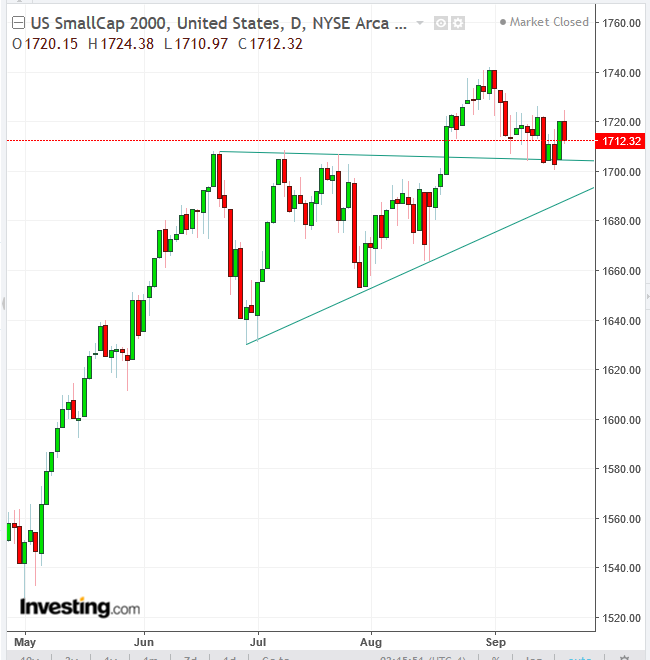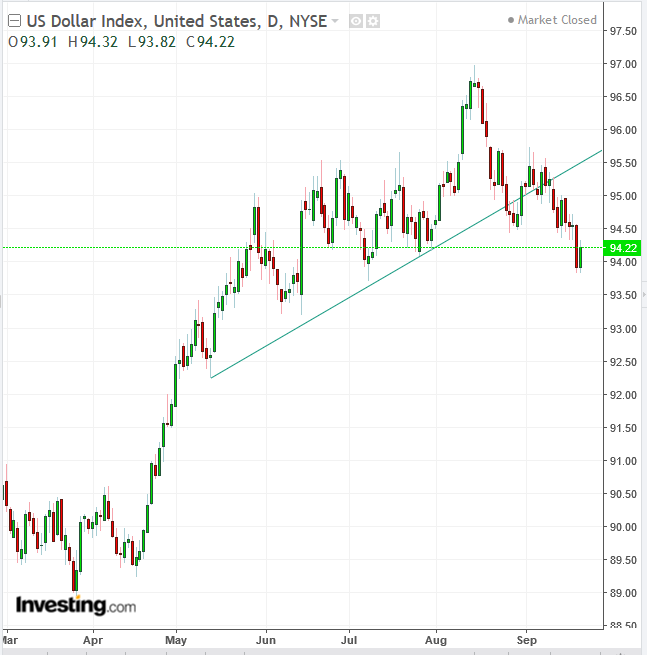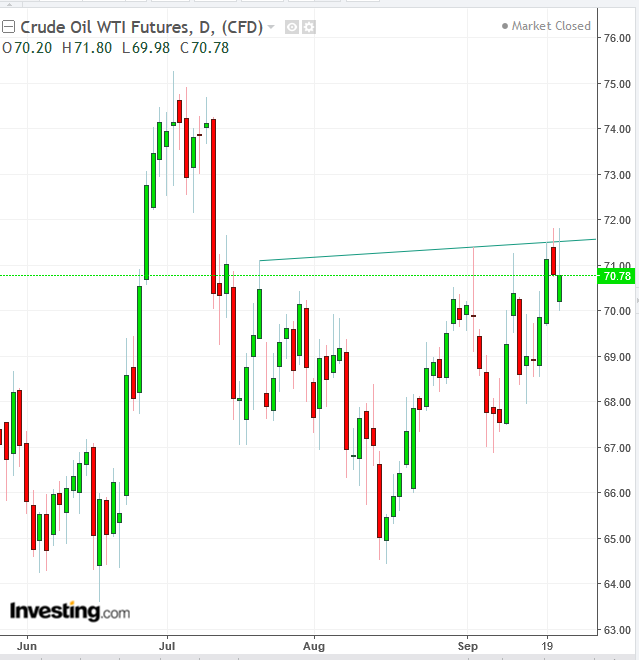- Dow posts fresh record on Friday, capping off record-setting week for US major indices
- Dollar reverses lower on rotation out of safe havens, into stocks
Quadruple Witching Drives Volatility
Though Quadruple Witching took its toll on US equities this past Friday—with the S&P 500, NASDAQ Composite and Russell 2000 all declining—it was, nonetheless a record breaking week, with, in our view, more gains to come.
On the third Friday of every March, June, September and December, market index futures, market index options, stock options and stock futures all expire. Referred to as Quadruple Witching, volatility usually increases significantly, as traders rebalance their holdings, driving some of the biggest trading days of the year. This past Friday was no exception. Not surprising, traders used the opportunity to take profits. Big tech stocks, such as Amazon (NASDAQ:AMZN), Apple (NASDAQ:AAPL) and Facebook (NASDAQ:FB) weighed on averages.
This past Friday was also notable for another reason. The largest revision to date to the Global Industry Classification Standard (GICS), took place. Put together in 1999 by MSCI and Standard and Poor's, the GICS divides financial market companies into sectors, industry groups, industries and sub-industries. Based on the new classification structure, Facebook and Alphabet (NASDAQ:GOOGL) will shift out of information technology, the biggest industry classification, and be moved into communications, a category set to replace the telecom designation, by merging existing phone companies with some Internet and media stocks.
Target-Rich Environment
Large caps climbed for the second week, posting fresh records, despite rising interest rates and ongoing trade disputes. The S&P 500 Index gave up its record-breaking high, to close mostly flat, with a 0.04 percent decline, ending a three-day streak. For the week, Communication Services (-0.65 percent) overshadowed gains in the Energy sector (+0.63 percent). The most-watched US equity benchmark capped a weekly 0.85 percent advance with Materials (+1.94 percent) and Industrials (+1.18 percent) pushing higher, as trade concerns were brushed aside. Financials (+1.81 percent) advanced on a rising interest rate environment, further helping the SPX gain. Confirming the sense of overall confidence, defensive Utilities (-2.28 percent) dropped.
More noteworthy, however, was the performance of the Dow Jones Industrial Average. Until recently it had been a laggard, signaling jittery investor sentiment on the US-Sino trade war, due to the mega cap companies listed on the index being highly export sensitive.
This past week though, the Dow outperformed. It was the only major benchmark that advanced Friday, by 0.32 percent, posting a fresh record, the last major US index to do so since the late -January correction. It jumped a whopping 2.25 percent for the week, its fifth advance out of six.
The NASDAQ Composite declined on Friday, down 0.51 percent, off 0.29 percent for the week.

The Russell 2000 slumped on Friday, falling 0.46 percent, for a total loss of 0.55 percent on the week. Technically, the small-cap index completed a successful return move to a bullish ascending triangle. The return move succeeded because it found apparent support at the pattern top, despite the selloffs.
Interestingly, the Dow's record high on Friday suggests the depth of the current trader disregard for worries about global trade. Nevertheless, the bullish small-cap pattern may indicate that sentiment is about to turn.
Still, overall we expect equity advances to continue on corporate earnings, economic growth and technicals. However volatility will also remain a factor.
Short term traders should benefit from a “target rich” environment. However, caution is advised. The possibility of being stopped out by whipsaws could negatively offset the increased potential reward opportunity with expanded potential risk. As such, it’s not enough to be right about the market direction. It's also crucial to be smart about the timing.
Risk Sentiment Back?

Bets on the Fed fund futures suggest that traders have already priced in the near-certainty of the next rate hike to occur this coming week. Yet the dollar reversed course, after last week posting the second trough in a descending peak-trough succession.
From a macroeconomic standpoint, the near-10 percent rise for the global reserve currency from the February low was spurred by economic growth compounded by the Fed's tightening. Why, then would the dollar head lower, as oppose to a take-profit downward correction while remaining within the uptrend? Perhaps, traders have become desensitized to the back-and-forth drama of the trade war, which had boosted the dollar as a safe haven asset?
If that’s the case, traders are—justifiably or not from a fundamental perspective—rotating out of the FX haven and into stocks, which posted records last week. Most notably, the Dow may be a proxy for the “diminishing-trade-war-fear” trade.

OPEC and NOPEC are struggling to replace Iran's missing oil supply amid disagreement on how the cartel and its allies should do so. Technically, WTI crude advanced to $71.81, peeking above the trend line connecting the highs since July 20, forming the neckline of an H&S bottom. However, the price failed to close above it, falling back to the $69.98.
Nonetheless, its close, at $70.78, suggests that the round psychological number provided support. That is, there was enough demand at that price level to absorb and outweigh the supply, "supporting" the price.
Week Ahead
All times listed are EDT
Monday
4:00L Germany – IFO Index (September): business climate index to rise to 103.2 from 103.8.
8:30: US – Chicago Fed Index (August): index expected to increase to 0.2 from 0.13.
19:50: Japan – BoJ Meeting Minutes: the release should provide additional insight into the discussion behind the central bank's latest monetary policy decision.
Tuesday
10:00: US – Conference Board Consumer Confidence (September): expected to fall to 132.2 from 133.4.
Wednesday
10:00: US – New Home Sales (August): expected to increase by 630K from 627K MoM.
10:30: US – EIA Crude Oil Inventories: stockpiles forecast to fall to -3.677M from -2.057M a week earlier.
14:00: US – Fed Interest Rate Decision (14:30 Press Conference): the US central bank is expected to raise rates to 2.25% from 2%. This is all but a foregone conclusion, so the market impact will be in their projections for future rate hikes, their assessment of the US economy and the effect (if any) from the US-China trade conflict.
Thursday
2:00: Germany – GfK Consumer Confidence (October): index to rise to 10.6 from 10.5.
5:00: Eurozone – Business and Consumer Survey (September): forecast to drop to 1.19 from 1.22.
8:00: Germany – CPI (September, preliminary): forecast to remain steady at 2% YoY.
8:30: US – GDP (Q2, final reading), Durable Goods Order (August), Personal Consumption Expenditure Prices (Q2, final): GDP to remain steady at 4.2% QoQ, Durable Goods orders to rise 1.9% from -1.7% MoM. PCE prices to increase 2.6% QoQ from 1.9%, and core PCE prices to remain steady at 2.00 percent.
10:00: US – Pending Home Sales (August): forecast to rise to -0.2% MoM from a -0.7 percent drop in July.
19:30: Japan – Unemployment (August): jobless rate to remain steady at 2.5%.
21:45: China – Caixin Manufacturing PMI (September): forecast to fall to 50.5 from 50.6.
Friday
3:55: Germany – Unemployment (September): unemployment rate to hold at 5.2%.
4:30: UK – GDP (Q2, final): forecast to remain steady at 1.3% YoY and 0.4% QoQ.
5:00: Eurozone – CPI (September): forecast to be 2.1% YoY from 2%, and core CPI to be 1.1% from 1%.
8:30: US – Personal Income and Spending (August): income to rise 0.4% MoM from 0.3% and spending to fall to 0.3% from 0.4%.
9:45: US – Chicago PMI (September): index to fall to 62.3 from 63.6.
10:00: US – Michigan Consumer Sentiment (September, final): index to hold at 100.8
